Analysis of Knowledge Management and Wise Leadership Article
VerifiedAdded on 2022/09/08
|6
|1066
|22
Report
AI Summary
This report provides an annotation of an article that explores the relationship between wise (phronetic) leadership, knowledge management capability, and innovation performance. The article emphasizes the importance of practical wisdom in leadership, drawing on Nonaka's explanation of wise leadership, and utilizes empirical methods with a sample of 144 participants. The research reveals a positive correlation between wise leadership and organizational innovation performance, with knowledge management playing a mediating role. The report analyzes key findings, including the positive impact of wise leadership on innovation, the role of knowledge management in fostering innovation, and the application of leadership theories such as transformational and situational leadership within the context of the research. The annotation critically assesses the article's credibility and provides a concise conclusion on the significance of practical wisdom and knowledge sharing in leadership and innovation.
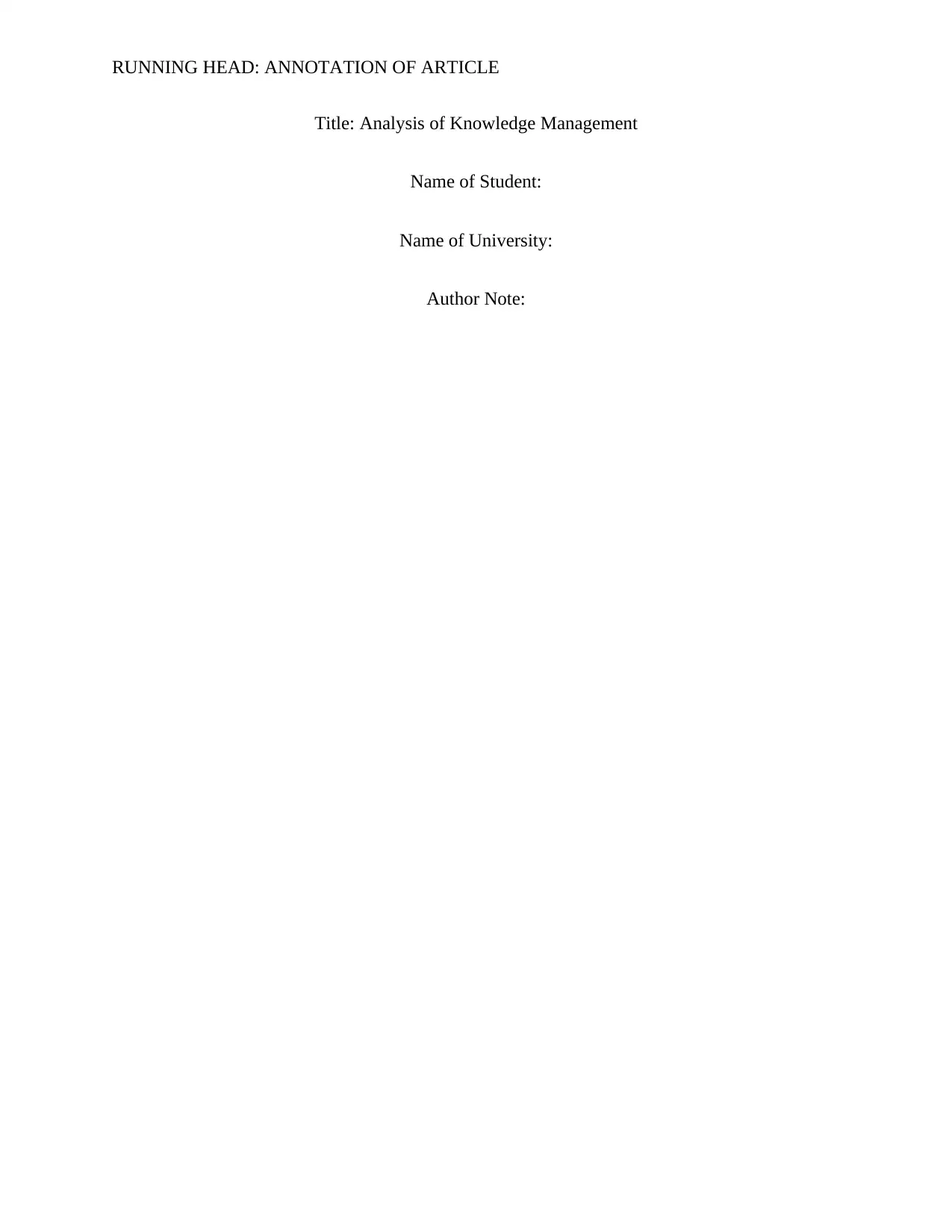
RUNNING HEAD: ANNOTATION OF ARTICLE
Title: Analysis of Knowledge Management
Name of Student:
Name of University:
Author Note:
Title: Analysis of Knowledge Management
Name of Student:
Name of University:
Author Note:
Paraphrase This Document
Need a fresh take? Get an instant paraphrase of this document with our AI Paraphraser
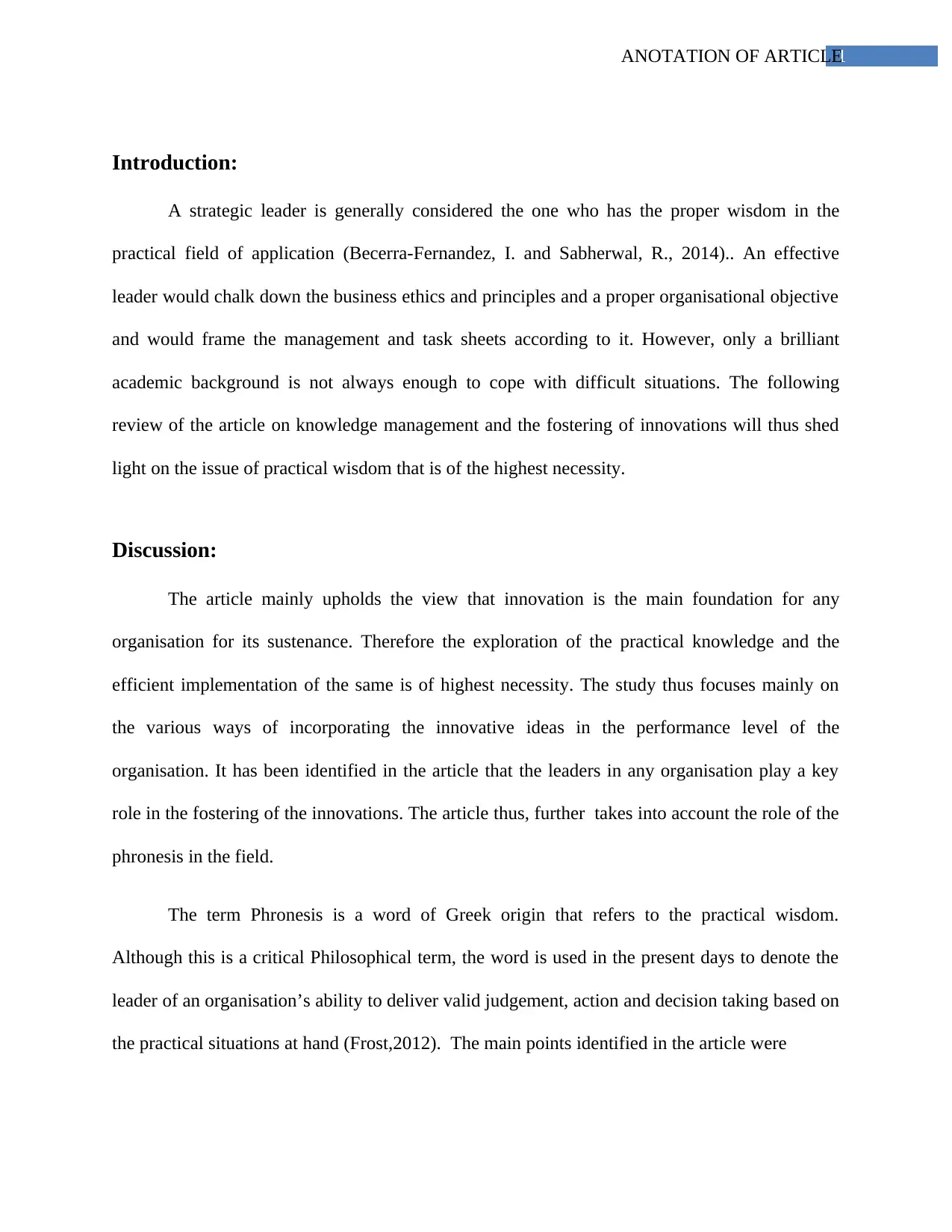
1ANOTATION OF ARTICLE
Introduction:
A strategic leader is generally considered the one who has the proper wisdom in the
practical field of application (Becerra-Fernandez, I. and Sabherwal, R., 2014).. An effective
leader would chalk down the business ethics and principles and a proper organisational objective
and would frame the management and task sheets according to it. However, only a brilliant
academic background is not always enough to cope with difficult situations. The following
review of the article on knowledge management and the fostering of innovations will thus shed
light on the issue of practical wisdom that is of the highest necessity.
Discussion:
The article mainly upholds the view that innovation is the main foundation for any
organisation for its sustenance. Therefore the exploration of the practical knowledge and the
efficient implementation of the same is of highest necessity. The study thus focuses mainly on
the various ways of incorporating the innovative ideas in the performance level of the
organisation. It has been identified in the article that the leaders in any organisation play a key
role in the fostering of the innovations. The article thus, further takes into account the role of the
phronesis in the field.
The term Phronesis is a word of Greek origin that refers to the practical wisdom.
Although this is a critical Philosophical term, the word is used in the present days to denote the
leader of an organisation’s ability to deliver valid judgement, action and decision taking based on
the practical situations at hand (Frost,2012). The main points identified in the article were
Introduction:
A strategic leader is generally considered the one who has the proper wisdom in the
practical field of application (Becerra-Fernandez, I. and Sabherwal, R., 2014).. An effective
leader would chalk down the business ethics and principles and a proper organisational objective
and would frame the management and task sheets according to it. However, only a brilliant
academic background is not always enough to cope with difficult situations. The following
review of the article on knowledge management and the fostering of innovations will thus shed
light on the issue of practical wisdom that is of the highest necessity.
Discussion:
The article mainly upholds the view that innovation is the main foundation for any
organisation for its sustenance. Therefore the exploration of the practical knowledge and the
efficient implementation of the same is of highest necessity. The study thus focuses mainly on
the various ways of incorporating the innovative ideas in the performance level of the
organisation. It has been identified in the article that the leaders in any organisation play a key
role in the fostering of the innovations. The article thus, further takes into account the role of the
phronesis in the field.
The term Phronesis is a word of Greek origin that refers to the practical wisdom.
Although this is a critical Philosophical term, the word is used in the present days to denote the
leader of an organisation’s ability to deliver valid judgement, action and decision taking based on
the practical situations at hand (Frost,2012). The main points identified in the article were
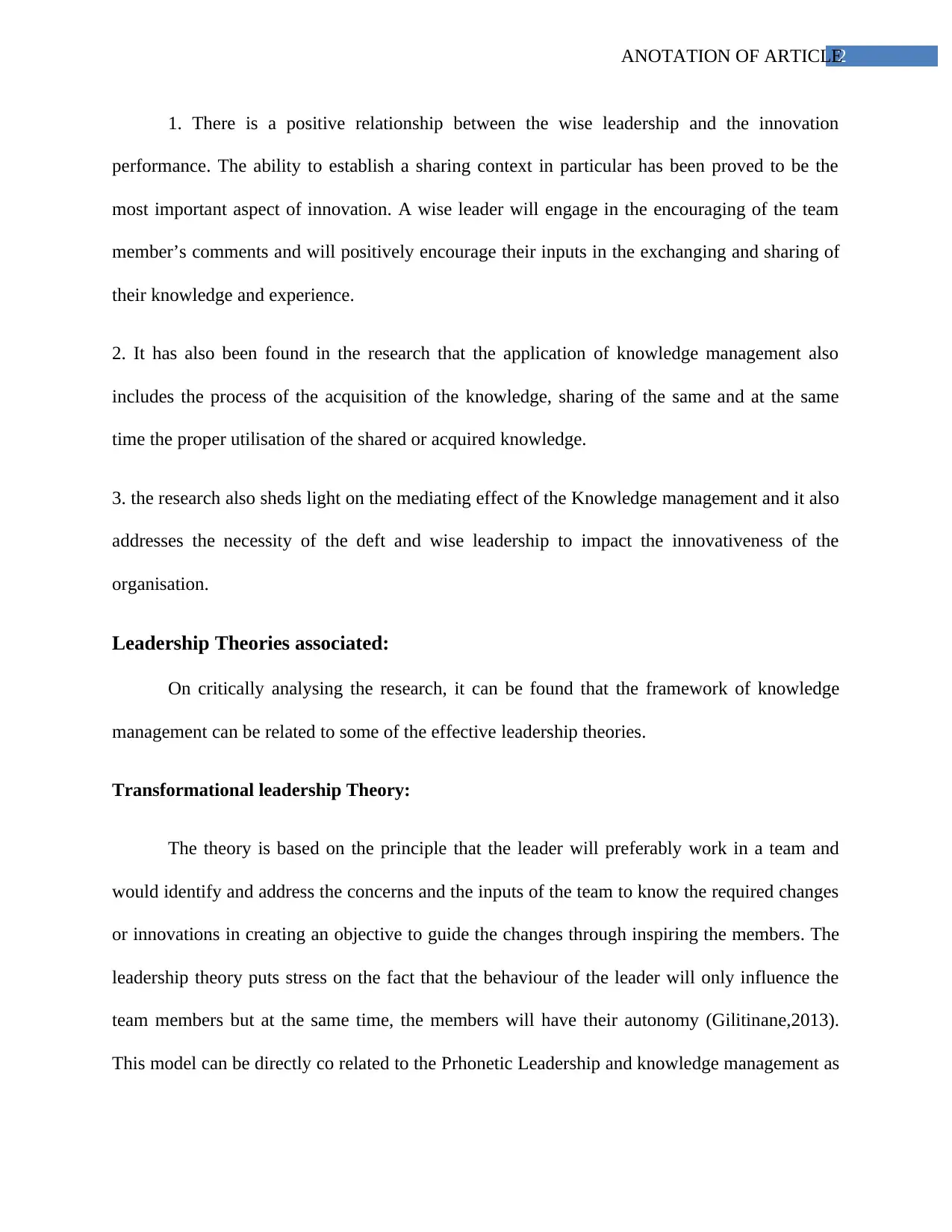
2ANOTATION OF ARTICLE
1. There is a positive relationship between the wise leadership and the innovation
performance. The ability to establish a sharing context in particular has been proved to be the
most important aspect of innovation. A wise leader will engage in the encouraging of the team
member’s comments and will positively encourage their inputs in the exchanging and sharing of
their knowledge and experience.
2. It has also been found in the research that the application of knowledge management also
includes the process of the acquisition of the knowledge, sharing of the same and at the same
time the proper utilisation of the shared or acquired knowledge.
3. the research also sheds light on the mediating effect of the Knowledge management and it also
addresses the necessity of the deft and wise leadership to impact the innovativeness of the
organisation.
Leadership Theories associated:
On critically analysing the research, it can be found that the framework of knowledge
management can be related to some of the effective leadership theories.
Transformational leadership Theory:
The theory is based on the principle that the leader will preferably work in a team and
would identify and address the concerns and the inputs of the team to know the required changes
or innovations in creating an objective to guide the changes through inspiring the members. The
leadership theory puts stress on the fact that the behaviour of the leader will only influence the
team members but at the same time, the members will have their autonomy (Gilitinane,2013).
This model can be directly co related to the Prhonetic Leadership and knowledge management as
1. There is a positive relationship between the wise leadership and the innovation
performance. The ability to establish a sharing context in particular has been proved to be the
most important aspect of innovation. A wise leader will engage in the encouraging of the team
member’s comments and will positively encourage their inputs in the exchanging and sharing of
their knowledge and experience.
2. It has also been found in the research that the application of knowledge management also
includes the process of the acquisition of the knowledge, sharing of the same and at the same
time the proper utilisation of the shared or acquired knowledge.
3. the research also sheds light on the mediating effect of the Knowledge management and it also
addresses the necessity of the deft and wise leadership to impact the innovativeness of the
organisation.
Leadership Theories associated:
On critically analysing the research, it can be found that the framework of knowledge
management can be related to some of the effective leadership theories.
Transformational leadership Theory:
The theory is based on the principle that the leader will preferably work in a team and
would identify and address the concerns and the inputs of the team to know the required changes
or innovations in creating an objective to guide the changes through inspiring the members. The
leadership theory puts stress on the fact that the behaviour of the leader will only influence the
team members but at the same time, the members will have their autonomy (Gilitinane,2013).
This model can be directly co related to the Prhonetic Leadership and knowledge management as
⊘ This is a preview!⊘
Do you want full access?
Subscribe today to unlock all pages.

Trusted by 1+ million students worldwide
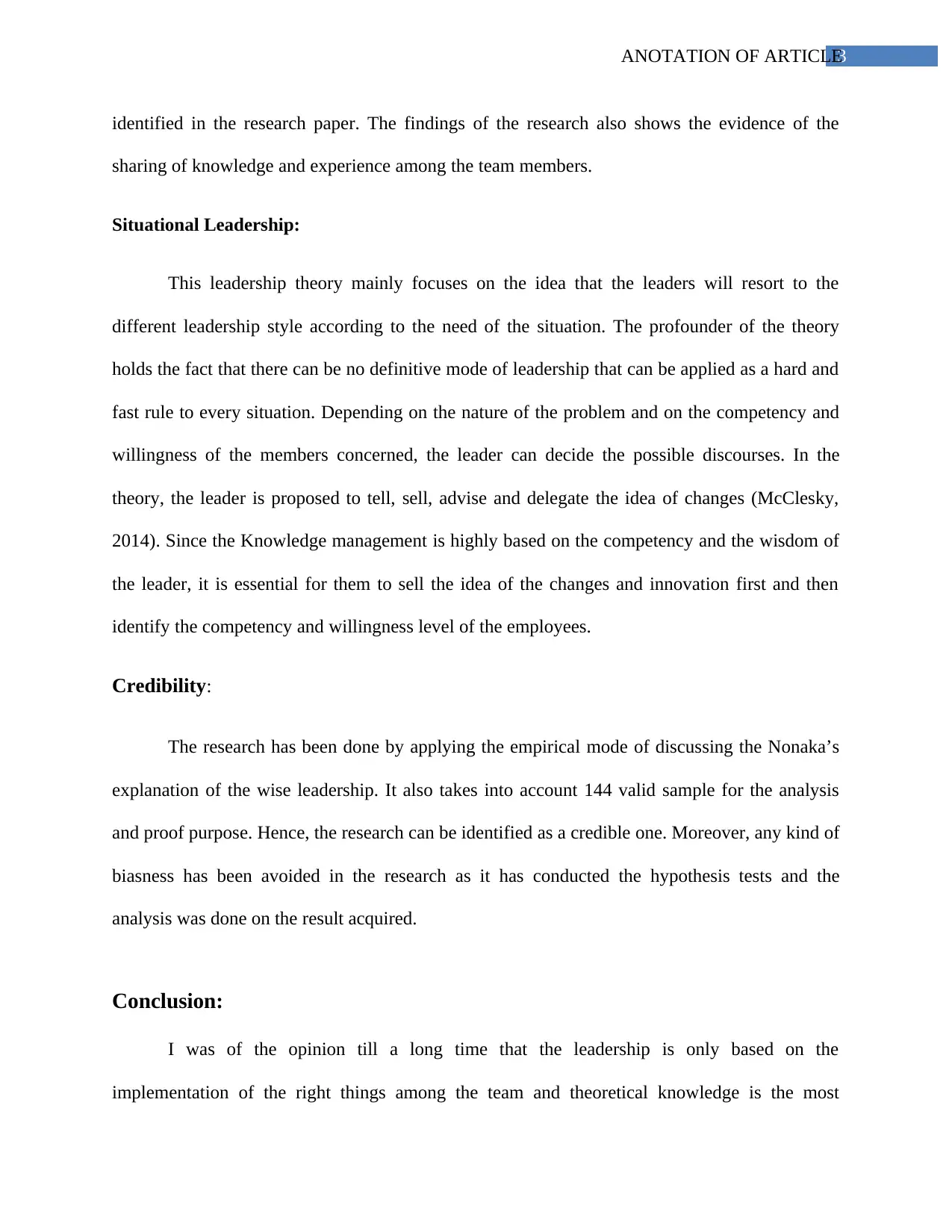
3ANOTATION OF ARTICLE
identified in the research paper. The findings of the research also shows the evidence of the
sharing of knowledge and experience among the team members.
Situational Leadership:
This leadership theory mainly focuses on the idea that the leaders will resort to the
different leadership style according to the need of the situation. The profounder of the theory
holds the fact that there can be no definitive mode of leadership that can be applied as a hard and
fast rule to every situation. Depending on the nature of the problem and on the competency and
willingness of the members concerned, the leader can decide the possible discourses. In the
theory, the leader is proposed to tell, sell, advise and delegate the idea of changes (McClesky,
2014). Since the Knowledge management is highly based on the competency and the wisdom of
the leader, it is essential for them to sell the idea of the changes and innovation first and then
identify the competency and willingness level of the employees.
Credibility:
The research has been done by applying the empirical mode of discussing the Nonaka’s
explanation of the wise leadership. It also takes into account 144 valid sample for the analysis
and proof purpose. Hence, the research can be identified as a credible one. Moreover, any kind of
biasness has been avoided in the research as it has conducted the hypothesis tests and the
analysis was done on the result acquired.
Conclusion:
I was of the opinion till a long time that the leadership is only based on the
implementation of the right things among the team and theoretical knowledge is the most
identified in the research paper. The findings of the research also shows the evidence of the
sharing of knowledge and experience among the team members.
Situational Leadership:
This leadership theory mainly focuses on the idea that the leaders will resort to the
different leadership style according to the need of the situation. The profounder of the theory
holds the fact that there can be no definitive mode of leadership that can be applied as a hard and
fast rule to every situation. Depending on the nature of the problem and on the competency and
willingness of the members concerned, the leader can decide the possible discourses. In the
theory, the leader is proposed to tell, sell, advise and delegate the idea of changes (McClesky,
2014). Since the Knowledge management is highly based on the competency and the wisdom of
the leader, it is essential for them to sell the idea of the changes and innovation first and then
identify the competency and willingness level of the employees.
Credibility:
The research has been done by applying the empirical mode of discussing the Nonaka’s
explanation of the wise leadership. It also takes into account 144 valid sample for the analysis
and proof purpose. Hence, the research can be identified as a credible one. Moreover, any kind of
biasness has been avoided in the research as it has conducted the hypothesis tests and the
analysis was done on the result acquired.
Conclusion:
I was of the opinion till a long time that the leadership is only based on the
implementation of the right things among the team and theoretical knowledge is the most
Paraphrase This Document
Need a fresh take? Get an instant paraphrase of this document with our AI Paraphraser
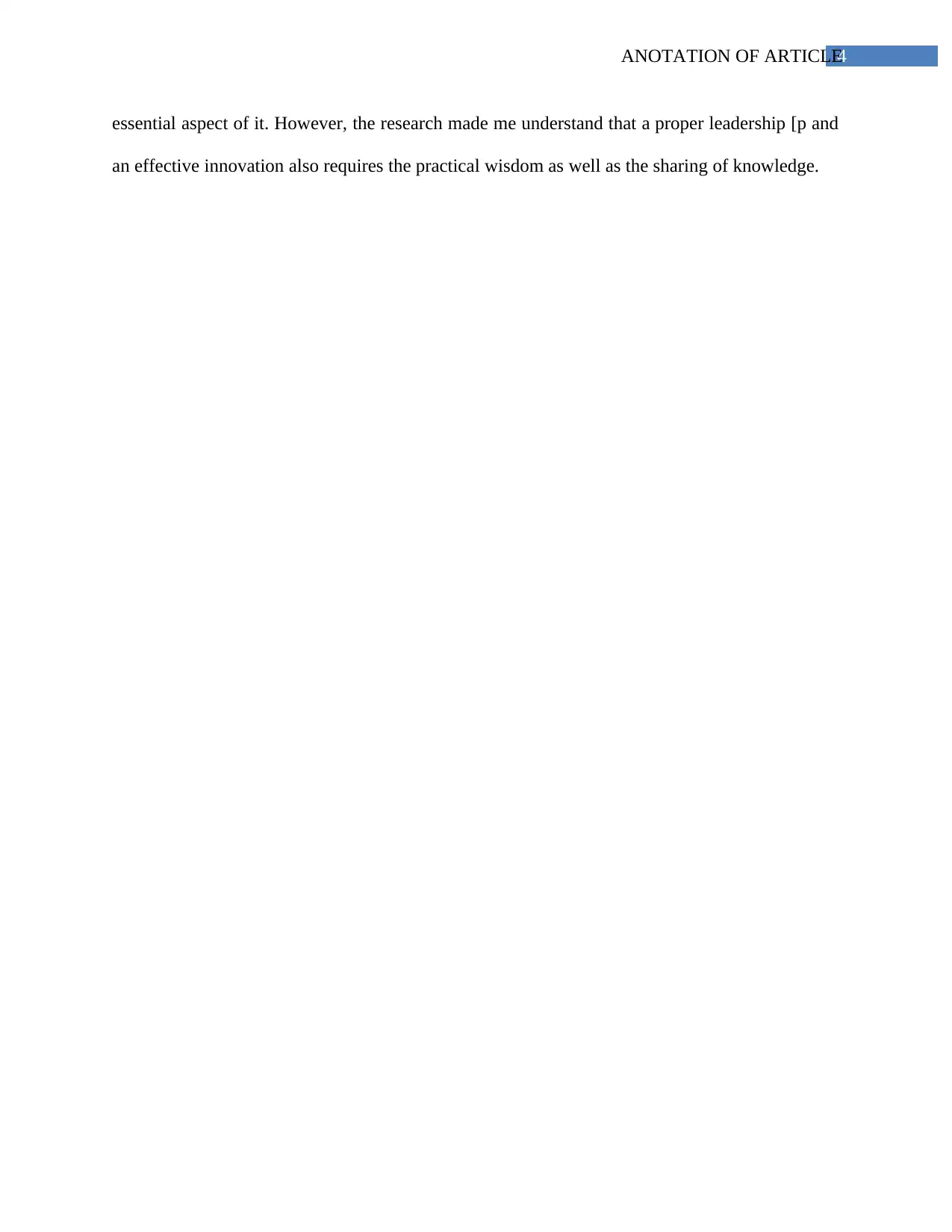
4ANOTATION OF ARTICLE
essential aspect of it. However, the research made me understand that a proper leadership [p and
an effective innovation also requires the practical wisdom as well as the sharing of knowledge.
essential aspect of it. However, the research made me understand that a proper leadership [p and
an effective innovation also requires the practical wisdom as well as the sharing of knowledge.
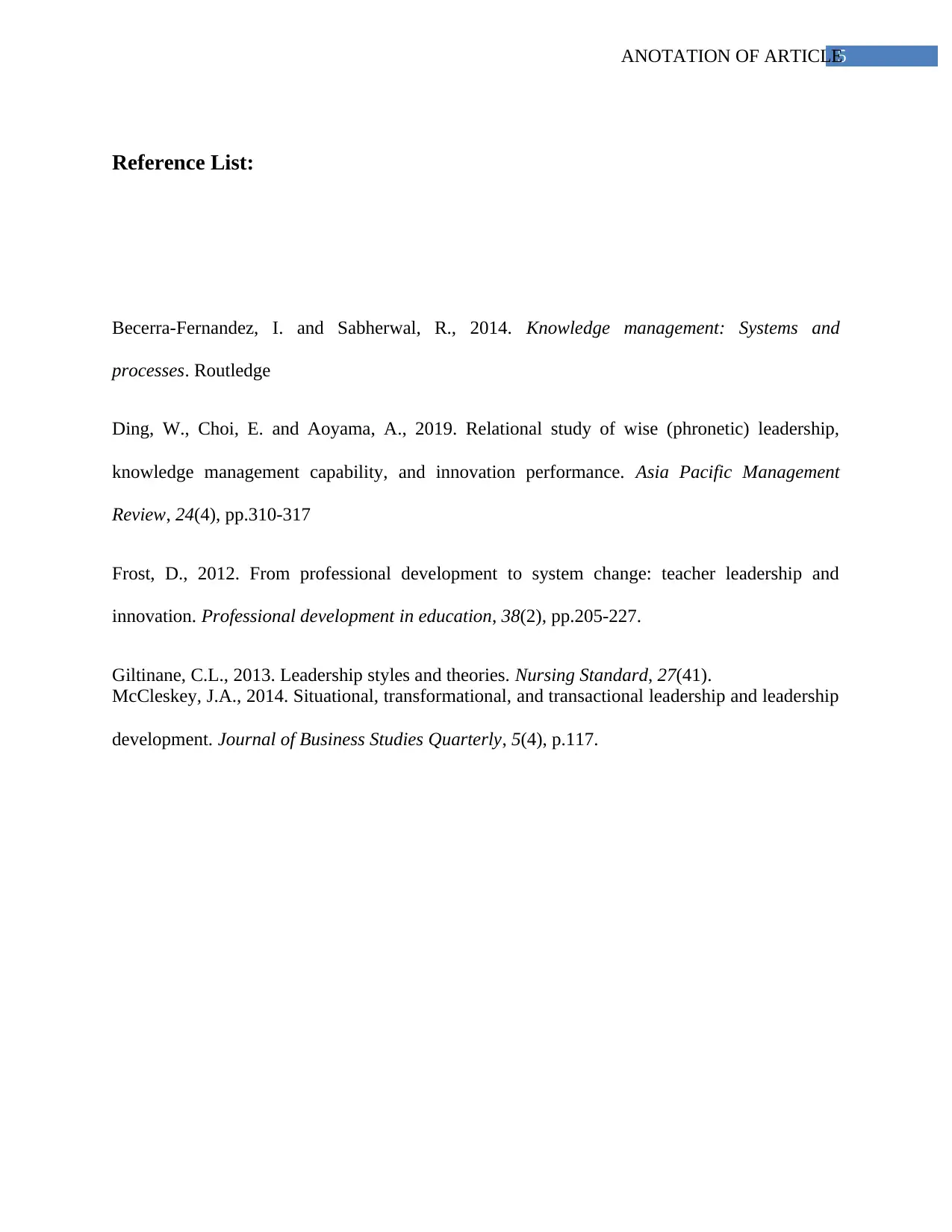
5ANOTATION OF ARTICLE
Reference List:
Becerra-Fernandez, I. and Sabherwal, R., 2014. Knowledge management: Systems and
processes. Routledge
Ding, W., Choi, E. and Aoyama, A., 2019. Relational study of wise (phronetic) leadership,
knowledge management capability, and innovation performance. Asia Pacific Management
Review, 24(4), pp.310-317
Frost, D., 2012. From professional development to system change: teacher leadership and
innovation. Professional development in education, 38(2), pp.205-227.
Giltinane, C.L., 2013. Leadership styles and theories. Nursing Standard, 27(41).
McCleskey, J.A., 2014. Situational, transformational, and transactional leadership and leadership
development. Journal of Business Studies Quarterly, 5(4), p.117.
Reference List:
Becerra-Fernandez, I. and Sabherwal, R., 2014. Knowledge management: Systems and
processes. Routledge
Ding, W., Choi, E. and Aoyama, A., 2019. Relational study of wise (phronetic) leadership,
knowledge management capability, and innovation performance. Asia Pacific Management
Review, 24(4), pp.310-317
Frost, D., 2012. From professional development to system change: teacher leadership and
innovation. Professional development in education, 38(2), pp.205-227.
Giltinane, C.L., 2013. Leadership styles and theories. Nursing Standard, 27(41).
McCleskey, J.A., 2014. Situational, transformational, and transactional leadership and leadership
development. Journal of Business Studies Quarterly, 5(4), p.117.
⊘ This is a preview!⊘
Do you want full access?
Subscribe today to unlock all pages.

Trusted by 1+ million students worldwide
1 out of 6
Related Documents
Your All-in-One AI-Powered Toolkit for Academic Success.
+13062052269
info@desklib.com
Available 24*7 on WhatsApp / Email
![[object Object]](/_next/static/media/star-bottom.7253800d.svg)
Unlock your academic potential
Copyright © 2020–2026 A2Z Services. All Rights Reserved. Developed and managed by ZUCOL.





